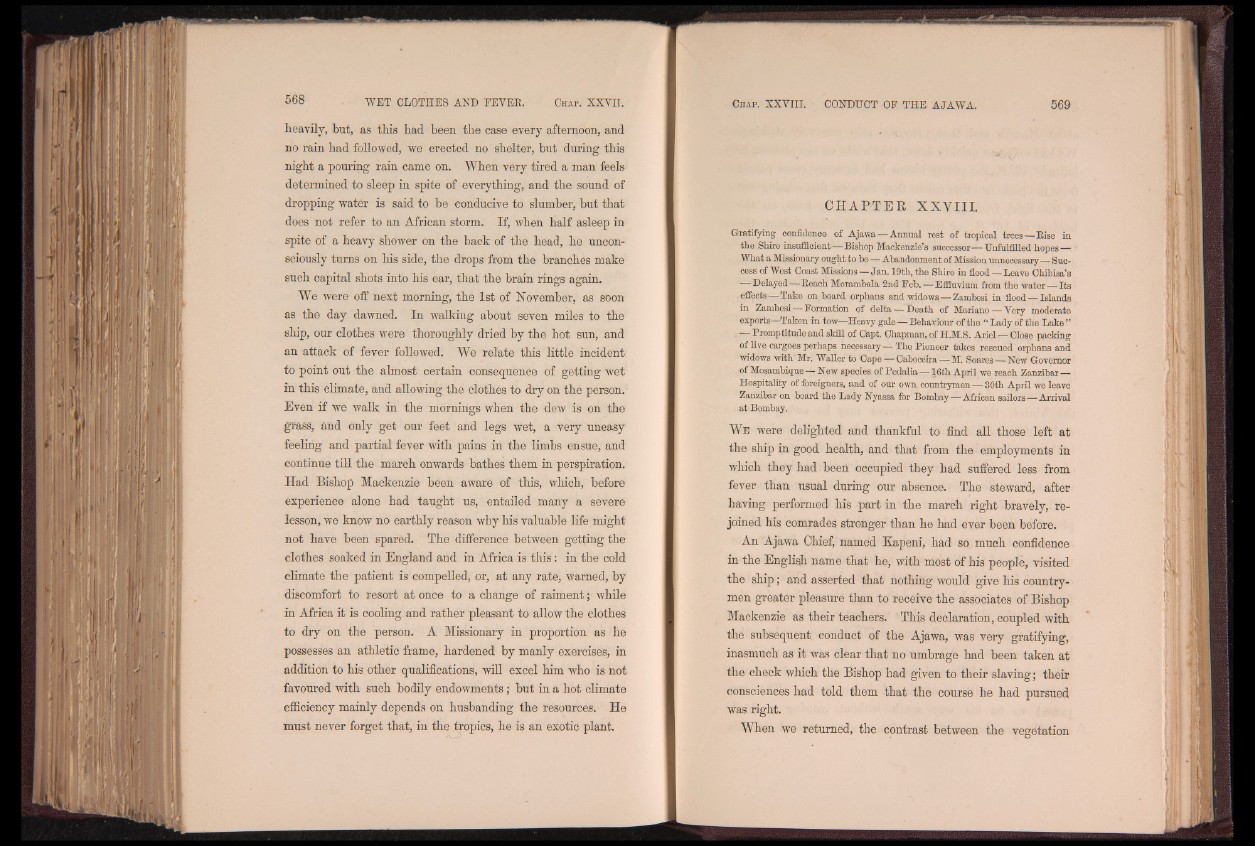
heavily, but, as this had been the case every afternoon, and
no rain had followed, we erected no shelter, but during this
night a pouring rain came on. When very tired a man feels
determined to sleep in spite of everything, and the sound of
dropping water is said to he conducive to slumber, but that
does not refer to an African storm. If, when half asleep in
spite of a heavy shower on the hack of the head, he unconsciously
turns on his side, the drops from the branches make
such capital shots into his ear, that the brain rings again.
We were off next morning, the 1st of November, as soon
as the day dawned. In walking about seven miles to the
ship, our clothes were thoroughly dried by the hot sun, and
an attack of fever followed. We relate this little incident
to point out the almost certain consequence of getting wet
in this climate, and allowing the clothes to dry on the person.
Even if we walk in the mornings when the dew is on the
grass, and only get our feet and legs wet, a very uneasy
feeling and partial fever with pains in the limbs ensue, and
continue till the march onwards bathes them in perspiration.
Had Bishop Mackenzie been aware of this, which, before
experience alone had taught us, entailed many a severe
lesson, we know no earthly reason why his valuable life might
not have been spared. The difference between getting the
clothes soaked in England and in Africa is th is: in the cold
climate the patient is compelled, or, at any rate, warned, by
discomfort to resort at once to a change of raiment; while
in Africa it is cooling and rather pleasant to allow the clothes
to dry on the person. A Missionary in proportion as he
possesses an athletic frame, hardened by manly exercises, in
addition to his other qualifications, will excel him who is not
favoured with such bodily endowments; but in a hot climate
efficiency mainly depends on husbanding the resources. He
must never forget that, in the tropics, he is an exotic plant.
C H A P T E R XXYI I I .
Gratifying confidence of Ajawa—Annual rest of tropical trees—Eise in
the Shire insufficient— Bishop Mackenzie’s successor — Unfulfilled hopes—
What a Missionary ought to be — Abandonment of Mission unnecessary—■ Success
of West Coast Missions — Jan. 19th, the Shire in flood — Leave Chibisa’s
■ -Delayed—Eeach Morambala 2nd Feb. — Effluvium from the water—Its
.effects — Take on board orphans and widows — Zambesi in flood — Islands
in Zambesi ■— Formation of delta — Death of Mariano — Very moderate
exports—Taken in tow—Heavy gale—Behaviour of the “ Lady of the Lake ”
^.Promptitude and skill of Capt. Chapman, of H.M.S. Ariel — Close packing
of live cargoes perhaps necessary ■— The Pioneer takes rescued orphans and
widows with Mr. Waller to Cape -|pCaboceira — M. Soares -— New Governor
of Mosambique — New species of Pedalia — 16th April we reach Zanzibar—
Hospitality of foreigners, and of our own. countrymen —- 30th April we leave
Zanzibar on board the Lady Nyassa for Bombay—African sailors—Arrival
at Bombay.
We were delighted and thankful to find all those left at
the ship in good health, and that from the employments in
which they had . been occupied they had suffered less from
fever than usual during our absence. The steward, after
having performed his part in the march right bravely, rejoined
his comrades stronger than he had ever been before.
An Ajawa Chief, named Kapeni, had so much confidence
in the English name that he, with most of his people, visited
the ship; and asserted that nothing would give his countrymen
greater pleasure than to receive the associates of Bishop
Mackenzie as their teachers. This declaration, coupled with
the subsequent conduct of the Ajawa, was very gratifying,
inasmuch as it was clear that no umbrage had been taken at
the check which the Bishop had given to their slaving; their
consciences had told them that the course he had pursued
was right.
When we returned, the contrast between the vegetation